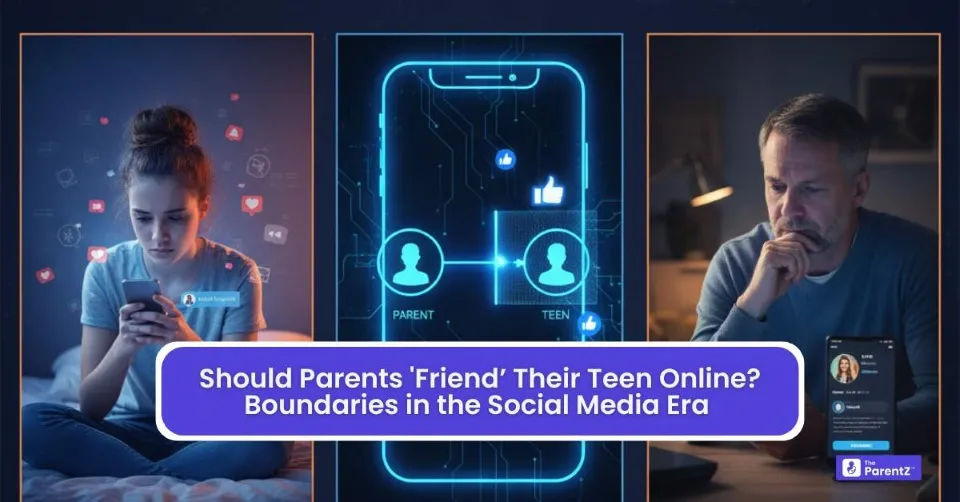Let's talk about something that's probably keeping you up at night: Should you send that friend request to your teenager on Instagram? Should you follow them on TikTok? What about Snapchat?
Let's get one thing straight: there's no one-size-fits-all answer. We know, you probably wanted to read "yes, do it" or "no, don't." But the truth is, it depends on your kid, your relationship, and honestly, how you handle what you see.
Understanding Their World First
Your teen lives in two worlds simultaneously. There's the one where they sit across from you at dinner, and there's the one where they're texting three group chats, posting Stories, and keeping streaks alive with people you've never met.
Social media isn't just "a thing" they do; it's where they exist. It's their hallway conversations, their passed notes in class, their hangout spot after school. Except now, it's all happening on screens, 24/7, and that's both amazing and terrifying.
They're building their identity online. They're figuring out who they are, testing out different versions of themselves, and getting validation through likes and comments. Sometimes it's harmless. Sometimes it's cringey. And sometimes, it can go really wrong.
The Reality We Can't Ignore
Social media has become a hunting ground for predators. Scammers. Bullies who don't stop when school ends. People pretending to be someone they're not. Your teen might think they're chatting with a 16-year-old from the next town over, but you know better than to take that at face value.
And then there's the stuff that just comes with being online, like comparison culture, peer pressure on steroids, trends that range from silly to dangerous, and content that no parent wants their kid exposed to.
So if you want to keep tabs, that is totally understandable. But, when it comes to actually doing it, that's where it gets complicated.
The "Friend Request" Dilemma
When you friend your teen on Facebook or follow them on Instagram, here's what usually happens: they either accept because they feel they have to, or they create a second "finsta" (fake Instagram) that you don't know about. Neither situation is ideal.
Some teens are totally fine with their parents following them. They post wholesome content, they've got nothing to hide, and honestly, their social media is pretty boring. If that's your kid, lucky you. Hit that follow button.
But most teens want some space. Not because they're doing anything wrong, but because they're trying to be themselves without their parents watching every move. Remember when you were a teen and didn't want your mom listening in on every phone call? Same energy, different decade.
Finding Your Own Balance
Instead of thinking about this as "should I or shouldn't I," think about what actually works for YOUR family.
- The Open Door Policy: You're connected on everything, but you've promised not to comment on their posts or embarrass them. You're there, watching from the sidelines, and they know it. This works when there's already solid trust and communication.
- The Spot Check Agreement: You're not following them, but they know you might ask to see their phone occasionally. No sneaking, no spying—just regular check-ins. They keep their privacy; you keep your peace of mind.
- The Gradual Approach: Maybe you start by being connected when they're younger, then slowly step back as they show they can handle responsibility online. Or vice versa—you give freedom first and connect if there are red flags.
- The Complete Trust Route: You're not following them at all. This works when your teen has consistently shown good judgment, you've had lots of conversations about online safety, and they come to you when something feels off.
What Matters More Than Following
Whether or not you follow your teen matters less than whether you're talking to them. Are you asking about their online life the way you'd ask about their day at school? Do they know they can come to you if someone makes them uncomfortable online? Have you talked about what to do if they see something disturbing?
Set some ground rules together. No social media during family dinner. No posting location in real-time. No accepting friend requests from strangers. Privacy settings on public. These conversations matter more than your follower count.
And keep checking in. What works for a 13-year-old won't work for a 17-year-old. Your relationship with their social media use should evolve as they do.
Conclusion
You know your kid better than any article can tell you. If something feels off, it probably is. If they're suddenly super secretive about their phone, spending way more time online, or their mood changes dramatically after scrolling, those are signs to dig deeper, friend request or not.
The goal isn't to spy on your teen. It's to keep them safe while helping them learn to handle this digital world they're growing up in. Sometimes that means being connected online. Sometimes it means stepping back and trusting the foundation you've built.
There's no perfect answer here. Just your answer. And that's okay.





Be the first one to comment on this story.